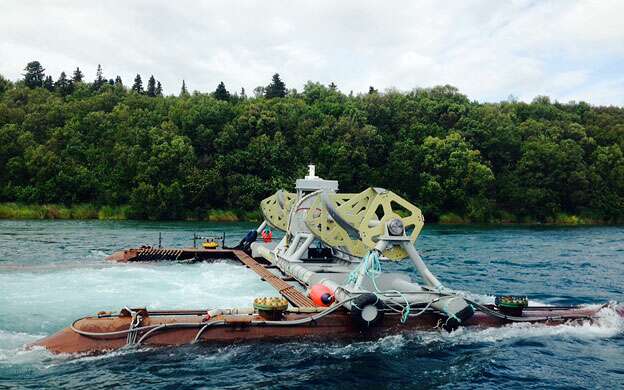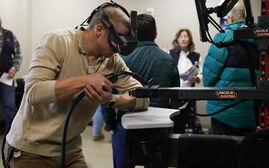
ORPC picks up three wins on path to commercialization
 Courtesy / ORPC
ÉireComposites and ORPC team members pose in front of one of two commercial RivGen Power System turbines built at ÉireComposites’ facility in Galway. The two commercial-size turbines are en route to Alaska, where they will be installed in the Kvichak River to provide power for the remote village of Igiugig.
Courtesy / ORPC
ÉireComposites and ORPC team members pose in front of one of two commercial RivGen Power System turbines built at ÉireComposites’ facility in Galway. The two commercial-size turbines are en route to Alaska, where they will be installed in the Kvichak River to provide power for the remote village of Igiugig.
Ocean Renewable Power Co., a marine energy company based in Portland, racked up three big wins this month that significantly advance the commercialization of its renewable river and tidal energy systems.
The three wins are:
- The Federal Energy Regulatory Commission’s approval to install and operate a full-size river marine renewable energy project in Igiugig, Alaska, under a pilot permit.
- Completion of two full-scale RivGen turbines by ORPC’s Irish partner ÉireComposites Teo, which will be installed in Igiugig this summer.
- A $200,000 grant from the U.S. Department of Energy’s Office of Energy Efficiency and Renewable Energy advancing the development of a tidal-powered energy storage system to provide renewable electricity to the rural community of False Pass, Alaska.
“We’re gaining momentum,” Chris Sauer, co-founder and CEO of ORPC, told Mainebiz in a telephone interview. “It all fits together and it’s all according to plan. We’re firing on all cylinders right now.”
Sauer, who co-founded the company in 2004 with Paul H. Wells and John R. Cooper, says the focus for the past 15 years was chiefly on research and development of its tidal-power generating system, called TidGen, and its river-power generating system, RivGen.
The company, which has 20 employees in the United States, is the only one worldwide to have built, operated and delivered power to a utility grid from both renewable tidal energy and river energy turbines.
Win No. 1
Earlier this month, U.S. Sen. Lisa Murkowski, R-Alaska, announced the Federal Energy Regulatory Commission had approved ORPC’s application for a pilot permit to install and operate a full-size river marine renewable energy project on the Kvichak River in Igiugig.
As chairman of both the Committee on Energy and Natural Resources and the Interior-Environment Appropriations Subcommittee, Murkowski championed grant funding to help make the Igiugig project a reality.
“She’s been a huge supporter,” Sauer said of Murkowsi, adding that Alaska’s other U.S. senator, Dan Sullivan, also is a key ally. “They have been instrumental in a significant number of ways.”

Last summer, for example, the Republican senators joined U.S. Sens. Susan Collins, R-Maine, and Angus King, I-Maine, in successfully urging the Department of Energy to award a $2.3 million grant to the Igiugig project, which leveraged an additional $5 million in funding from the state and private sector.
The Igiugig Marine Renewable Energy Project will produce emission-free electricity by converting the energy of river currents into a reliable source of electricity, which is expected to cost significantly less to produce than the 80-to-90-cents per kilowatt hour the village pays for its kerosene-generated power. The Igiugig Village Corp. is the first tribal entity in the United States to achieve this approval, and ORPC has been collaborating with the village, which is located 275 miles southwest of Anchorage on the project, since 2009.
FERC approval was achieved through the agency’s pilot license process, established to encourage development of innovative hydrokinetic technology while ensuring appropriate environmental monitoring is in place. ORPC’s pioneering RivGen power system is scheduled to be installed later this summer once permits from the Alaska Department of Fish and Game, Alaska Department of Natural Resources, and Alaska Lake and Peninsula Borough are approved.
“I am so pleased this project will be able to move forward, reducing local diesel consumption and energy prices,” Murkowski said in a news release announcing FERC’s approval of the pilot permit. “Igiugig’s efforts are blazing a trail for marine renewable energy and microgrid solutions around the world — when we prove these technologies can work in rural Alaska, we are proving they can work just about anywhere else on the planet.”
Sauer says the full-scale RivGen turbines being installed in Igiugig offer a “proof of concept” opportunity to demonstrate the system’s ability to provide reliable electricity at a significant savings to 2 billion mostly indigenous people worldwide who live in remote, off-grid communities, with roughly 700 million currently relying on very expensive, environmentally risky diesel fuel to power their homes.
In its sales pitch to potential investors, ORPC estimates the market for remote communities paying more than 80-cents per kilowatt hour represents $1.8 billion of revenue potential for the company.
“It’s a huge, huge opportunity for us,” Sauer says of the Igiugig project.
Win No. 2
Sauer says ORPC’s partnership with ÉireComposites Teo, an Irish company located in County Galway, resulted in the completion of the two full-scale RivGen turbines that will be installed in Igiugig this summer. Using unique manufacturing processes, ÉireComposites was able to build more powerful RivGen turbines at a lower cost for ORPC, he said.
“It reduced the cost by about half,” Sauer said, noting that lowering RivGen’s production costs and improving its power-generation capabilities are key elements of attracting other customers in remote regions with expensive power.
ÉireComposites is a design, manufacturing, and testing company involved in lightweight, high performance, fiber-reinforced composite materials. It has an international customer base of over 70 companies in the aerospace, automotive and renewable energy sectors, according to the company’s website.
James Donegan, ORPC’s director of European operations, said ÉireComposites’ contribution includes “proprietary expertise,” such as its patented powder epoxy composite manufacturing method, and the use of a “robust first-of-a-kind composite joint design that will increase reliability and service life of the RivGen power system.”
“With these ÉireComposites-built turbines, we will also increase turbine capture area and, thereby, increase power output,” he said.
Tomas Flanagan, ÉireComposites’ owner, said in a news release in early June that working with ORPC on the RivGen power system has been a great opportunity for his company as well. “Our manufacture of the foils illustrates our company’s ability to use our core talents to develop innovative new commercial products,” he said.
Win No. 3
The third win, announced this month by Collins and King, is the $200,000 Phase 1 grant ORPC received from the U.S. Department of Energy’s Office of Energy Efficiency and Renewable Energy to advance development of a tidal-powered energy storage system to provide renewable electricity to the rural community of False Pass, Alaska.
The competitively awarded grant is through the Small Business Innovation Research program, which supports “high-quality research related to important scientific problems.” The program, which offers additional phased grants for projects deemed successful, targets “small business ventures recognized as having the potential for larger-scale commercialization as well as benefits to the community at large.”
Sauer said ORPC has been working on a tidal project in False Pass for three or four years. “It’s the first community you come to on the Aleutian Islands,” he said. “It’s got tremendous tidal currents. We’ve been doing site assessment work and studying their grid.”
The SBIR Phase 1 grant, he said, will be used to assess how “smart microgrid technology” could be used in concert with ORPC’s TidGen turbines to create a resilient and much cheaper power supply for False Pass than its current diese-generated power source.
“We want to reduce their diesel usage by 90% — how to do that is what we’re studying in False Pass,” Sauer said. “It’s got a great resource.”
Getting through the ‘valley of death’
Looking back over the past 15 years, Sauer said ORPC has been slowly moving through the stages of being a startup to the point where it’s on the cusp of being a mature company serving commercial markets with proven needs for reliable renewable energy.
“We are very close to reaching the other side. We can almost touch it.” — Chris Sauer, ORPC co-founder and CEO
It’s currently raising private investment capital through the equity crowdfunding platform of Netcapital, an online effort that had raised $640,134 by June 7, Sauer said.
“Our goal is to raise $10 million,” he said, noting that in addition to reaching out to Main Street investors through Netcapital, the company is seeking investment capital through accredited, impact and institutional investors as well.
At times the “valley of death” that startups face as they advance to commercialization has seemed like the Grand Canyon to the ORPC team, Sauer said, noting that the effort to reach the other side has sometimes seemed comparable to the distance between the Grand Canyon’s two rims.
“We are very close to reaching the other side,” he said. “We can almost touch it.”














0 Comments